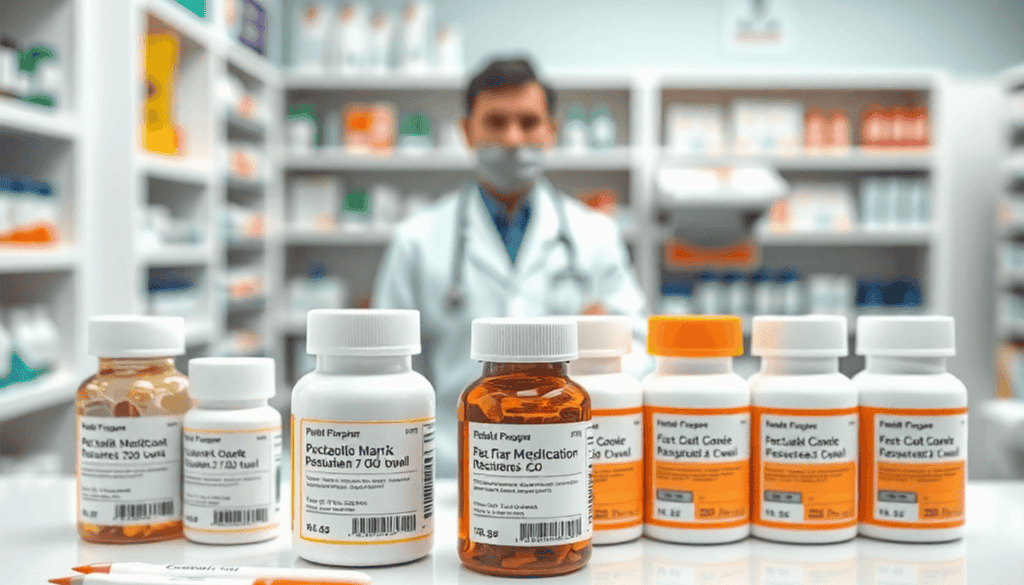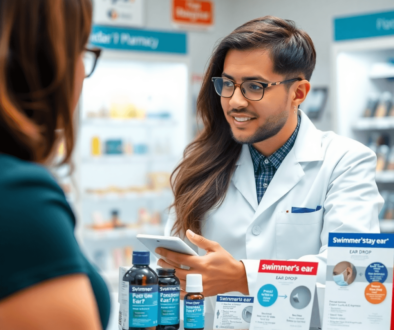What Makes a Pharmacy ‘Personalized’? Key Differences Explained
A personalized pharmacy, often known as a compounding pharmacy, stands out from traditional pharmacies by customizing medications to suit individual patient needs. Unlike standard pharmacies that dispense mass-produced drugs, personalized pharmacies create tailored formulations based on specific requirements. For instance, if you’re dealing with a bladder infection, a personalized pharmacy could provide you with a medication specifically formulated for your condition.
Understanding the differences between these two types of pharmacies is crucial for making informed decisions about your healthcare. By exploring the distinct approaches of personalized and traditional pharmacies, you can identify the most suitable option to address your medication needs effectively. However, it’s also worth considering the convenience offered by online pharmacies like MisterPharmacist, which provides fast prescription delivery in Toronto. This could be particularly beneficial if you’re in urgent need of medication for conditions such as syphilis, which is unfortunately making a comeback and requires prompt treatment.
What Is a Personalized Pharmacy?
A personalized pharmacy, often called a compounding pharmacy, specializes in creating customized medications tailored specifically to the unique needs of each patient. Unlike traditional pharmacies that dispense standard, mass-produced drugs, compounding pharmacies prepare medications by combining, altering, or mixing ingredients to match precise prescriptions.
Compounding pharmacists work closely with healthcare providers to develop formulations that address individual health concerns. This approach allows for adjustments in dosage strength, medication form, flavor, and ingredient selection—ensuring patients receive individualized care that fits their lifestyle and medical requirements.
Examples of unique formulations offered by personalized pharmacies include:
- Liquid medications for children: Many young patients struggle with swallowing pills. Compounding pharmacies create flavored liquid versions of medications to improve palatability and ease of administration. In such cases, redosing after vomiting can be a concern for parents.
- Hypoallergenic options: Patients with allergies or sensitivities to common fillers and dyes benefit from medications compounded without these irritants.
- Customized topical creams: Hormone replacement therapies or pain relief medications can be compounded into creams tailored to exact dosage needs.
- Pet medications: Flavored compounds designed specifically for animals help ensure proper dosing when standard veterinary drugs are unavailable or unsuitable.
- Combination therapies: Multiple active ingredients may be combined into a single dose, simplifying complex medication regimens.
The ability to personalize medications extends beyond form and flavor; it also encompasses adjustments for patients who require specific dosages not commercially available or those who need to avoid certain components due to health conditions. This precision supports better treatment outcomes by addressing issues that standard pharmaceuticals cannot solve.
Compounding pharmacies emphasize safety and quality by using pharmaceutical-grade ingredients and following strict preparation protocols. The focus on individualized care highlights their key role in modern healthcare—providing solutions where traditional pharmacies may fall short.
Moreover, personalized pharmacies can also cater to specific needs like ADHD medications in Canada, providing a comprehensive comparison for 2025. They also play an essential role in managing conditions like measles through customized treatment plans.
Traditional Pharmacy: The Standard Model
Traditional pharmacies primarily dispense mass-produced medications created using standardized formulas designed to treat common conditions on a large scale. These medications are manufactured in bulk by pharmaceutical companies, then distributed to pharmacies where prescriptions are filled based on these uniform products.
Key characteristics of traditional pharmacies include:
- Dispensing pre-packaged drugs that follow FDA-approved formulations.
- Providing medications available in fixed dosages and forms such as tablets, capsules, or injectables.
- Relying on established supply chains to maintain inventory of widely prescribed medications.
- Offering convenience and accessibility for patients needing standard treatments.
While traditional pharmacies serve the majority of patients effectively, they face limitations when addressing unique or complex medication needs:
- Inflexibility in dosage adjustments beyond standard increments.
- Lack of alternative formulations for patients who have difficulties swallowing pills or require customized delivery methods.
- Limited options for those with allergies or sensitivities to common drug additives like dyes, preservatives, or fillers.
- Challenges accommodating compounded combinations or tailored therapies that involve mixing multiple active ingredients.
These constraints mean patients with specialized requirements often find traditional pharmacies less capable of providing solutions tailored precisely to their health situations. This is where the role of personalized pharmacies becomes particularly significant. They fill the gap left by the one-size-fits-all approach of mass-produced medications, offering customized care that traditional pharmacies cannot easily replicate.
Key Differences Between Personalized and Traditional Pharmacies
In the world of pharmacies, personalized and traditional ones differ greatly in many ways. These differences impact the level of care and customized solutions they offer to patients. Here are the main distinctions that separate them:
1. Medication Preparation Methods
- Personalized Pharmacies: Focus on compounding medications tailored to individual needs, adjusting dosages, forms, and ingredients as per patient requirements.
- Traditional Pharmacies: Dispense pre-packaged medications manufactured in bulk with standardized formulas, offering limited flexibility for customization.
2. Catering to Unique Health Needs
- Personalized Pharmacies: Specialize in addressing uncommon health needs that standard medications may not fulfill, such as allergies, sensitivities, or specific dosages.
- Traditional Pharmacies: Primarily cater to common health conditions with mass-produced medications that may not suit individualized requirements.
3. Impact on Medication Adherence
- Personalized Pharmacies: Enhance adherence by providing customized dosage forms (e.g., liquids, creams) or flavors tailored to patient preferences.
- Traditional Pharmacies: Offer conventional medication forms (e.g., tablets, capsules) which may pose challenges for patients with swallowing difficulties or taste aversions.
4. Potential for Reducing Side Effects through Personalization
- Personalized Pharmacies: Reduce side effects by excluding allergens, fillers, or unnecessary additives from compounded medications while tailoring doses precisely.
- Traditional Pharmacies: Standard medications may contain additives that trigger adverse reactions in sensitive individuals due to their mass-produced nature.
By understanding these key differences between personalized and traditional pharmacies, patients can make better choices about their healthcare needs and preferences. For example, if you’re dealing with common health problems like heartburn, a personalized pharmacy might be able to offer solutions that traditional pharmacies can’t provide. Additionally, it’s important to be aware of the potential risks associated with overmedication, which is more likely to happen when you rely solely on standardized medication from traditional pharmacies.
The Role and Expertise of Compounding Pharmacists
Compounding pharmacists hold a unique position within the pharmacy profession due to their specialized training and expertise. Unlike general pharmacists, compounding pharmacists undergo additional education focused on the art and science of creating customized medications that meet individual patient needs.
Their specialized training includes:
- Understanding pharmaceutical compounding techniques, such as mixing, combining, or altering ingredients to produce tailored dosage forms like creams, gels, liquids, or suppositories.
- Mastering pharmacokinetics and pharmacodynamics to accurately adjust dosages based on patient-specific factors such as age, weight, allergies, and medical history.
- Ensuring compliance with complex regulatory standards set by organizations like the United States Pharmacopeia (USP), which govern sterile and non-sterile compounding practices to guarantee safety and efficacy.
- Developing proficiency in using professional-grade equipment and selecting pharmaceutical-grade ingredients that maintain medication stability and potency.
This advanced skill set equips compounding pharmacists to translate a prescriber’s tailored instructions into safe, effective medications that are not commercially available. Their role extends beyond dispensing; it involves collaboration with healthcare providers and patients to optimize treatment outcomes through personalized care solutions.
Patients benefit from the knowledge that these pharmacists apply rigorous scientific principles and quality controls in every compounded medication they prepare.
Regulatory Standards Ensuring Safety in Personalized Pharmacies
The regulatory oversight for compounding pharmacies is crucial to ensuring patient safety and the efficacy of customized medications. Here’s a closer look at the standards that exist to protect patients from harm:
1. FDA Regulations
The Food and Drug Administration (FDA) plays a vital role in regulating compounding pharmacies to ensure that compounded medications meet quality and safety standards. They enforce regulations to oversee the preparation, labeling, and dispensing of compounded drugs.
2. USP Standards
The United States Pharmacopeia (USP) sets specific standards for compounding practices to guarantee the quality, purity, strength, and consistency of compounded medications. These standards help maintain the integrity of the compounding process and protect patient welfare.
By adhering to these regulatory guidelines, compounding pharmacies can provide patients with personalized medications that are safe, effective, and tailored to their individual needs. The stringent oversight by regulatory bodies like the FDA and USP helps maintain high-quality standards in the preparation of compounded medications, ensuring patient well-being is prioritized at all times.
Benefits of Choosing a Personalized Pharmacy for Patients
Individualized treatment benefits:
- Improved Health Outcomes: Patients can experience better health outcomes with medications tailored to their specific needs, potentially leading to more effective treatment results.
- Enhanced Patient-Centered Care: Personalized pharmacies focus on individual patients, offering customized solutions that prioritize patient preferences and requirements.
- Tailored Medication Solutions: Patients receive medications formulated to address their unique health conditions, preferences, and restrictions.
- Increased Medication Adherence: Customized flavors or alternative forms make it easier for patients to adhere to their medication regimens, improving overall treatment compliance.
- Reduced Side Effects: By eliminating unnecessary additives and tailoring dosages precisely, compounded medications may lead to fewer side effects compared to standard medications.
By choosing a personalized pharmacy, patients can benefit from treatments that are specifically designed to meet their individual needs, resulting in more personalized care and potentially better health outcomes.
Conclusion
The rise of personalized pharmacies marks a significant shift in how medications address individual health needs. These pharmacies go beyond the standard, mass-produced solutions by offering tailored formulations that improve treatment effectiveness and patient satisfaction.
Consider exploring a personalized pharmacy if you face challenges with traditional medications, such as allergies, dosage issues, or unique delivery methods. For instance, if you’re dealing with specific dietary concerns related to zinc absorption, a personalized approach could provide the necessary adjustments to your medication or supplement regimen.
Key points to remember:
- Personalized pharmacy benefits summary includes customized medication solutions and enhanced adherence.
- What makes a pharmacy ‘personalized’? It’s the dedication to individualized care that standard pharmacies can’t always provide.
Your healthcare deserves this level of attention and customization.



